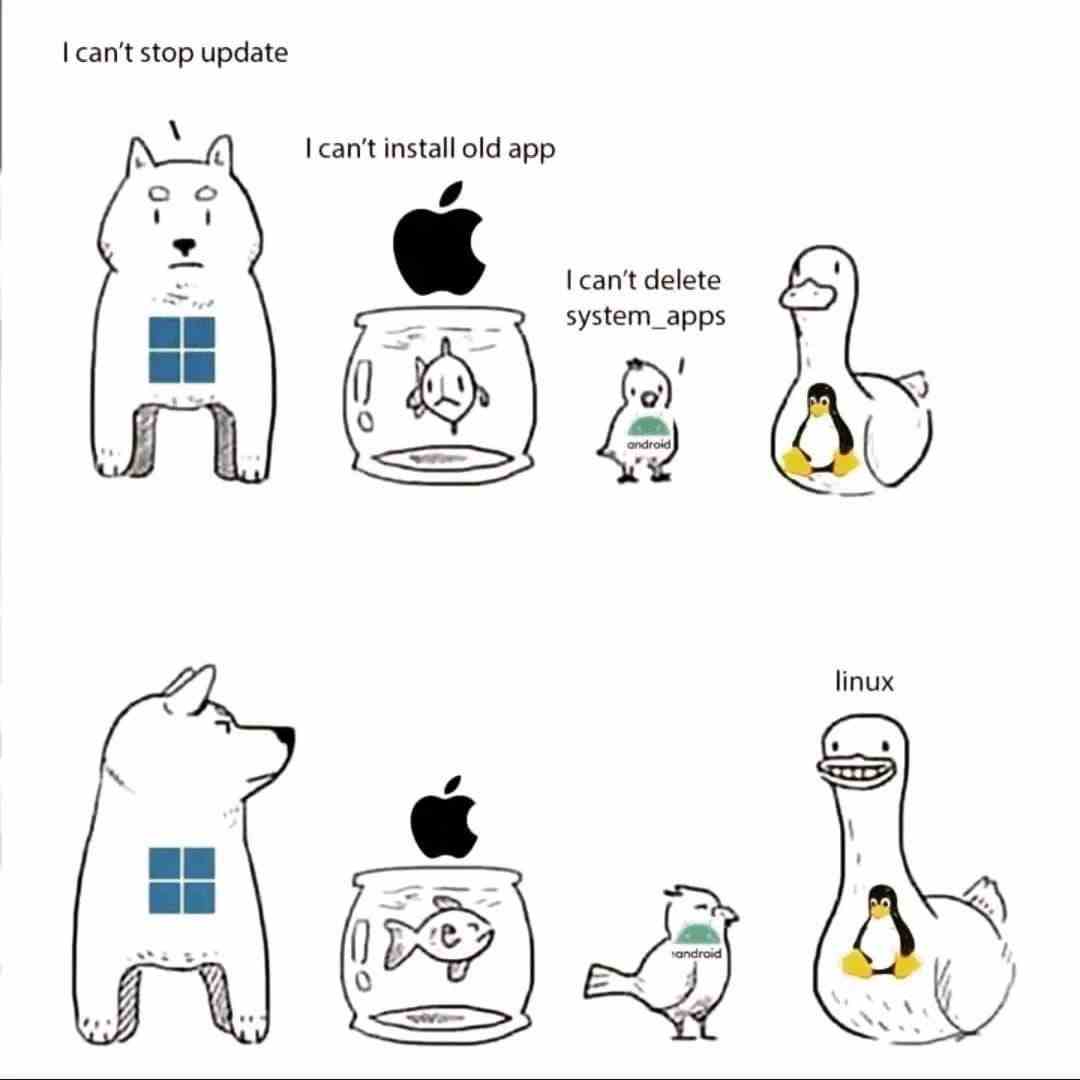this post was submitted on 25 Sep 2023
1150 points (92.3% liked)
linuxmemes
21378 readers
1300 users here now
Hint: :q!
Sister communities:
Community rules (click to expand)
1. Follow the site-wide rules
- Instance-wide TOS: https://legal.lemmy.world/tos/
- Lemmy code of conduct: https://join-lemmy.org/docs/code_of_conduct.html
2. Be civil
- Understand the difference between a joke and an insult.
- Do not harrass or attack members of the community for any reason.
- Leave remarks of "peasantry" to the PCMR community. If you dislike an OS/service/application, attack the thing you dislike, not the individuals who use it. Some people may not have a choice.
- Bigotry will not be tolerated.
- These rules are somewhat loosened when the subject is a public figure. Still, do not attack their person or incite harrassment.
3. Post Linux-related content
- Including Unix and BSD.
- Non-Linux content is acceptable as long as it makes a reference to Linux. For example, the poorly made mockery of
sudoin Windows. - No porn. Even if you watch it on a Linux machine.
4. No recent reposts
- Everybody uses Arch btw, can't quit Vim, and wants to interject for a moment. You can stop now.
Please report posts and comments that break these rules!
Important: never execute code or follow advice that you don't understand or can't verify, especially here. The word of the day is credibility. This is a meme community -- even the most helpful comments might just be shitposts that can damage your system. Be aware, be smart, don't fork-bomb your computer.
founded 1 year ago
MODERATORS
you are viewing a single comment's thread
view the rest of the comments
view the rest of the comments

Appimage, Snap, Flatpak, Docker, Podman, Distrobox, Toolbox...
All potentially fantastic ideas had the original author bothered to package in any of those formats. Much more common is the only release is a .deb built for an ancient version of Ubuntu, leading to my above frustrstions.
I think we will become better served over time by using systems like the AUR or nix as it seems quite straightforward to make new software available with them. Both of those systems define the method a package should be built with, so even if the maintainer is long gone and the package hasn't been updated in a long time it will probably still be possible to build, or any changes needed to build it can be easily shared to save other people troubleshooting effort.
The drawbacks are: nix doesn't seem to have an elegant way to define that users or groups should be created (e.g. at least one package providing
locaterequires that) (though it does have at least one non-elegant way and one manual but less non-elegant way), and a package usable withpacmanhas lacked a definition of what version of every dependency it requires in at least one case where it would have been useful to me (even though that is possible apparently), so if anything made a backwards-incompatible change you may not be able to use the package manager alone to troubleshoot.AppImage has definitely made my life a lot easier in several cases!
I've had poor luck with AppImage. Because of how it works, it has failed in the exact thing it was supposed to do, just werk everywhere. But I've heard it generally works well.
Those are fairly recent solutions
We only use software that has existed before the past decade in this household!
I wonder if someone is packaging that stuff for the new solutions
I mean not really, Appimage has been around since 2004, flatpak/docker for about a decade now. But at any rate I don't see your point, the person I replied to said it's hard to run old applications on Linux and I gave him solutions on how to do that. What does their age have to do with anything?
I'm not sure if you're taking the piss but since those solutions are so recent, you won't find old applications packaged with those solutions.
They don't need to be packaged at the time of creation anyway, they can be packaged right now. Distrobox makes this easy, like let's say you need an application that only works on Ubuntu 18.04. It's two commands:
distrobox create --image ubuntu:18.04 ubuntudistrobox enter ubuntu -- sudo apt-get install _package_Then to export the package to your desktop you can even do
distrobox enter ubuntu -- distrobox export --app _application_Boom, you have an Ubuntu 18.04 application on an OS of your choosing. You can theoretically do this with any distro, distrobox can use any OCI images from docker-hub, quay.io, or any registry of your choice.
I wouldn't exactly call that easy, but compared to how it used to be, fair enough.